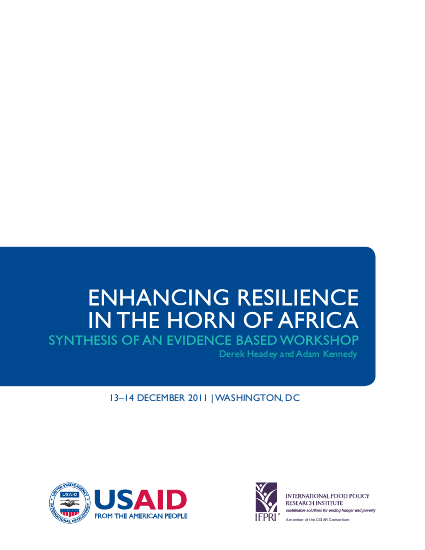Synthesis of an evidence-based workshop

The Horn of Africa is acutely vulnerable to food security crises that arise from complex causes, including swift shocks from the vagaries of climate—particularly exposure to drought and flooding—and slower-moving stresses like the complex nexus of rapid population growth, land fragmentation, natural resource degradation, and conflict. The 2010–2011 crisis in the region emphasized the shortcomings, as well as some of the strengths, of international and national relief efforts—namely that while they have saved lives, and increasingly livelihoods, they have not sufficiently increased the capacity of the region to withstand future shocks and stresses. In short, they have not done enough to enhance resilience to the point where the region can avert crises similar to the one it endured in 2010–2011. For a region like the Horn of Africa, resilience has profound implications for development programming. As US Agency for International Development (USAID) Administrator Rajiv Shah said, “For too long we have segregated humanitarian support and activities and development activities.… We haven’t seen the beauty of the possibilities that exist when we think of these things as a more integrated whole.”1 In that sense, resilience—in both concept and action—can bridge the two traditionally distinct domains of humanitarian assistance and development support programs. But how exactly should we define resilience, and what does this concept imply for programming, capacity strengthening, institution building, and development strategies as a whole? Is resilience already an important (if implicit) dimension of these efforts, or do we need to rethink and redesign the way our efforts are conceived and implemented? Based on previous and ongoing substantive efforts to build resilience, what types of interventions work or don’t work—and where is the evidence to show for it? These questions and issues that arise in the programming of our work together with our development partners in the Horn of Africa are the subject matter of much of the dialogue that took place at the “Enhancing Resilience in the Horn of Africa” workshop hosted by USAID in December 2011. The purpose of this set of proceedings is thus to present the key messages from the workshop and communicate evidence-based strategies that were highlighted to inform future programming of humanitarian and development assistance efforts. The goal is to bridge the two in a way that maximizes the impact of development partners’ efforts and enhances resilience to lift millions out of poverty, food, and social insecurity in the Horn of Africa.